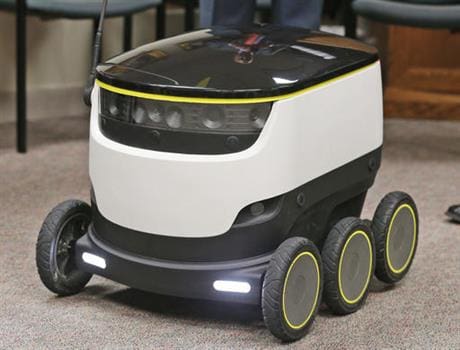 This news roundup marks the final edition of “This Week in Logistics News” for 2017. It has been a pretty incredible year for me covering logistics news and trends. My recent article highlighted some of the top news stories of the year, including the advancement of drone technology, the ongoing rivalry between Amazon and Walmart, President Trump’s influence on global trade, digital freight matching, advances in warehouse technologies, and e-commerce integration, to name a few. It’s been a pleasure bringing you the news this year, and I look forward to continuing to do so in the new year. We still have a few articles to publish next week, but for now, we’re signing off from the news as we count down to 2018.
This news roundup marks the final edition of “This Week in Logistics News” for 2017. It has been a pretty incredible year for me covering logistics news and trends. My recent article highlighted some of the top news stories of the year, including the advancement of drone technology, the ongoing rivalry between Amazon and Walmart, President Trump’s influence on global trade, digital freight matching, advances in warehouse technologies, and e-commerce integration, to name a few. It’s been a pleasure bringing you the news this year, and I look forward to continuing to do so in the new year. We still have a few articles to publish next week, but for now, we’re signing off from the news as we count down to 2018.
And now on to this week’s logistics news.
- Walmart makes last-minute holiday push for procrastinators
- Target to Acquire Shipt
- Amazon expands same-day delivery and one-day shipping
- Supervalu expands Instacart program to all of its retail stores
- Walmart, JD.com, IBM, and Tsinghua University Launch a Blockchain Food Safety Alliance
- San Francisco made things much tougher for robotic delivery startups this week
- PepsiCo pre-orders 100 Tesla Semis
- FMCSA will grant 90-day ELD waiver for short-term rental trucks
- UPS acquires Sandler & Travis Trade Advisory Services
 As we enter the final weeks of the holiday shopping season, Walmart is focusing its e-commerce efforts on in-store fulfillment rather than shipping items to customers. This is probably due in part to the surcharges levied on retailers by both FedEx and UPS. Walmart has qualified more items on Walmart.com for same-day in-store pick-up than during any other holiday season. The company said it sees demand for same-day order doubling during the final two weeks of the season. By offering more items for in-store pick-up, it allows procrastinators to skip the wait times associated with home delivery. With the e-commerce boom, and the delays it has caused for UPS and FedEx in delivering items, skipping these delays becomes incredibly important. Walmart will allow customers to shop online up until 4pm on December 23 for Christmas Eve pick-up by 6pm.
As we enter the final weeks of the holiday shopping season, Walmart is focusing its e-commerce efforts on in-store fulfillment rather than shipping items to customers. This is probably due in part to the surcharges levied on retailers by both FedEx and UPS. Walmart has qualified more items on Walmart.com for same-day in-store pick-up than during any other holiday season. The company said it sees demand for same-day order doubling during the final two weeks of the season. By offering more items for in-store pick-up, it allows procrastinators to skip the wait times associated with home delivery. With the e-commerce boom, and the delays it has caused for UPS and FedEx in delivering items, skipping these delays becomes incredibly important. Walmart will allow customers to shop online up until 4pm on December 23 for Christmas Eve pick-up by 6pm.
 Target is buying home-delivery start-up Shipt for $550 million. The move is designed to help Target keep pace with Amazon and Walmart by speeding up same day delivery. Shipt is a crowd-sourced delivery platform; when a customer places an order, one of Shipt’s “shoppers” goes to the store, picks up the item, and delivers it. The service costs $99 a year for unlimited deliveries. As part of the deal, Shipt will become a wholly-owned Target subsidiary, but will still solicit business from other retailers. As a result of the acquisition, Target plans to offer same-day delivery at about half of its 1,800 stores by summer. Following the initial roll-out, Target plans to have all stores on board for next year’s holiday season.
Target is buying home-delivery start-up Shipt for $550 million. The move is designed to help Target keep pace with Amazon and Walmart by speeding up same day delivery. Shipt is a crowd-sourced delivery platform; when a customer places an order, one of Shipt’s “shoppers” goes to the store, picks up the item, and delivers it. The service costs $99 a year for unlimited deliveries. As part of the deal, Shipt will become a wholly-owned Target subsidiary, but will still solicit business from other retailers. As a result of the acquisition, Target plans to offer same-day delivery at about half of its 1,800 stores by summer. Following the initial roll-out, Target plans to have all stores on board for next year’s holiday season.
 Just in time for some last-minute holiday shopping, Amazon announced that it has expanded its same-day and one-day delivery service. Previously, both services were available to Prime customers in 5,00 cities; now they are available in over 8,000 cities. The program allows customers to order an item in the morning and have it delivered by 9pm that night. If the order is placed in the evening, it will be delivered the next day. The expansion of the program will give Amazon an advantage as it gets closer to Christmas as it can offer more competitive shipping times for its customers.
Just in time for some last-minute holiday shopping, Amazon announced that it has expanded its same-day and one-day delivery service. Previously, both services were available to Prime customers in 5,00 cities; now they are available in over 8,000 cities. The program allows customers to order an item in the morning and have it delivered by 9pm that night. If the order is placed in the evening, it will be delivered the next day. The expansion of the program will give Amazon an advantage as it gets closer to Christmas as it can offer more competitive shipping times for its customers.
 Supervalu is expanding its relationship with home delivery company Instacart. Previously, only shoppers at Cub, the largest grocery chain in the Twin Cities, and Shop N Save, which is chiefly in the St. Louis area, could use Instacart. With the expanded program, shoppers at all Supervalu brands, including Cub, Farm Fresh, Shop N Save, and Shoppers, can use Instacart. When customers shop online they can schedule delivery of their order in as little as an hour. The company is also expanding its click and collect program, which enables shoppers to order online and pick-up their items at the store. Like many programs, Supervalu has designated parking areas for click and collect customers, and shoppers do not even have to leave their car to retrieve their order. Delivery is free for the first Instacart order. After that, the fee is $7.99 to $9.99 for one-hour delivery, $5.99 for standard delivery (later than one hour), and $1.99 for click-and-collect.
Supervalu is expanding its relationship with home delivery company Instacart. Previously, only shoppers at Cub, the largest grocery chain in the Twin Cities, and Shop N Save, which is chiefly in the St. Louis area, could use Instacart. With the expanded program, shoppers at all Supervalu brands, including Cub, Farm Fresh, Shop N Save, and Shoppers, can use Instacart. When customers shop online they can schedule delivery of their order in as little as an hour. The company is also expanding its click and collect program, which enables shoppers to order online and pick-up their items at the store. Like many programs, Supervalu has designated parking areas for click and collect customers, and shoppers do not even have to leave their car to retrieve their order. Delivery is free for the first Instacart order. After that, the fee is $7.99 to $9.99 for one-hour delivery, $5.99 for standard delivery (later than one hour), and $1.99 for click-and-collect.
 Walmart, JD.com, IBM, and Tsinghua University have launched a blockchain food safety alliance in China. The initiative is geared towards improving food traceability and safety in China. The four parties will create a standards-based method of collecting data using blockchain technology to provide real-time visibility and traceability throughout the supply chain. The data will focus on origin, safety, and authenticity of food. The end goal, aside from improving food safety, is to get more suppliers and retailers to join the alliance.
Walmart, JD.com, IBM, and Tsinghua University have launched a blockchain food safety alliance in China. The initiative is geared towards improving food traceability and safety in China. The four parties will create a standards-based method of collecting data using blockchain technology to provide real-time visibility and traceability throughout the supply chain. The data will focus on origin, safety, and authenticity of food. The end goal, aside from improving food safety, is to get more suppliers and retailers to join the alliance.
 The city of San Francisco wants to make home delivery much tougher this week for robotic delivery startups. Back in May, San Francisco Supervisor Norman Yee had proposed legislation to ban delivery robots of all types, saying they’re a public safety hazard. This week, the Board of Supervisors voted 5-1 in favor of handing down strict regulations on the cargo bots. Per the new rules, companies will be limited to three robots apiece, with nine total robots for the entire city. The robots will also need constant human monitoring, and must operate at a maximum speed of three MPH. Additionally, the robots can only operate in low population industrial areas. This last point basically defeats the entire purpose of the delivery robots all together. This is certainly not the direction the robotics startups were looking for.
The city of San Francisco wants to make home delivery much tougher this week for robotic delivery startups. Back in May, San Francisco Supervisor Norman Yee had proposed legislation to ban delivery robots of all types, saying they’re a public safety hazard. This week, the Board of Supervisors voted 5-1 in favor of handing down strict regulations on the cargo bots. Per the new rules, companies will be limited to three robots apiece, with nine total robots for the entire city. The robots will also need constant human monitoring, and must operate at a maximum speed of three MPH. Additionally, the robots can only operate in low population industrial areas. This last point basically defeats the entire purpose of the delivery robots all together. This is certainly not the direction the robotics startups were looking for.
![]() PepsiCo is betting big on Tesla’s new electric Semi trucks, with an advanced order of 100 trucks. This is largest order of the truck so far, surpassing Anheuser-Busch’s order of 40 electric, autonomous-enabled trucks. Tesla unveiled the new trucks last month, with a price tag of $150,000 for 300-mile range version, $180,000 for the 500-mile range version, and $200,000 for the Founders Series. Initially, the trucks required a $5,000 deposit on pre-orders, but that figure has risen to $20,000. For PepsiCo, that is an upfront investment of $2 million for an unknown entity. PepsiCo’s order joins other companies such as Walmart, Anheuser-Busch, J.B. Hunt, and Sysco as Tesla’s pre-orders have topped 285 so far. PepsiCo intends to deploy Tesla Semis for shipments of snack foods and beverages between manufacturing and distribution facilities, as well as direct to retailers within 500 miles.
PepsiCo is betting big on Tesla’s new electric Semi trucks, with an advanced order of 100 trucks. This is largest order of the truck so far, surpassing Anheuser-Busch’s order of 40 electric, autonomous-enabled trucks. Tesla unveiled the new trucks last month, with a price tag of $150,000 for 300-mile range version, $180,000 for the 500-mile range version, and $200,000 for the Founders Series. Initially, the trucks required a $5,000 deposit on pre-orders, but that figure has risen to $20,000. For PepsiCo, that is an upfront investment of $2 million for an unknown entity. PepsiCo’s order joins other companies such as Walmart, Anheuser-Busch, J.B. Hunt, and Sysco as Tesla’s pre-orders have topped 285 so far. PepsiCo intends to deploy Tesla Semis for shipments of snack foods and beverages between manufacturing and distribution facilities, as well as direct to retailers within 500 miles.
There have been many complaints and concerns voiced during protests over the electronic logging device (ELD) mandate, with many groups seeking delays in enforcement. Recent data shows that nearly 50 percent of owner-operators have not even selected an ELD yet. The Federal Motor Carrier Safety Administration (FMCSA) announced that is planning to grant a request from the Truck Renting and Leasing Association (TRALA) for a 90-day waiver from the ELD mandate for “short term” rental trucks. These are defined as being rented out for a period of 30 days or less. The group said this waiver gives its members until March 18, 2018, to get their rental trucks into compliance with the mandate.
 And finally, UPS announced that is has acquired Sandler & Travis Trade Advisory Services (STTAS), the largest global independent provider of global trade management services. STTAS focuses on helping clients comply with constantly changing and complex rules, regulations, and laws focusing on international trade. The company operates in Asia, Europe, the Middle East, North America, and South America. The acquisition is geared towards expanding UPS’ footprint as a global trade services, freight transportation, and logistics service provider. The majority of STTAS’ employees reside in key trade areas, including Shanghai, Bengaluru, Aberdeen, Warsaw, Mexico City, Buenos Aires, and São Paulo. Financial terms of the deal were not disclosed.
And finally, UPS announced that is has acquired Sandler & Travis Trade Advisory Services (STTAS), the largest global independent provider of global trade management services. STTAS focuses on helping clients comply with constantly changing and complex rules, regulations, and laws focusing on international trade. The company operates in Asia, Europe, the Middle East, North America, and South America. The acquisition is geared towards expanding UPS’ footprint as a global trade services, freight transportation, and logistics service provider. The majority of STTAS’ employees reside in key trade areas, including Shanghai, Bengaluru, Aberdeen, Warsaw, Mexico City, Buenos Aires, and São Paulo. Financial terms of the deal were not disclosed.
That’s all for this week. Enjoy the weekend and the song of the week, Europe’s The Final Countdown.


















Leave a Reply